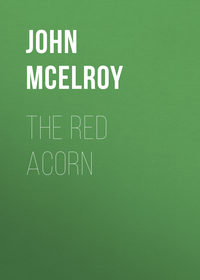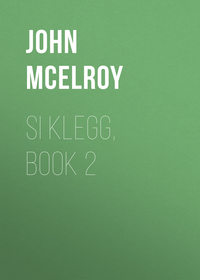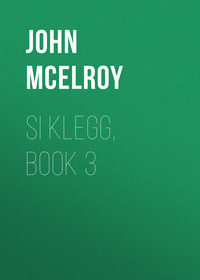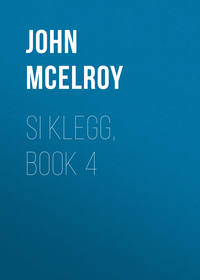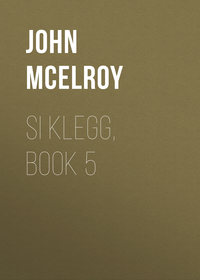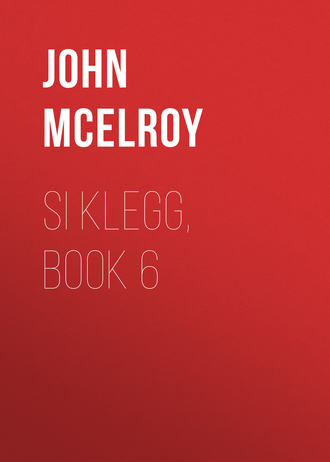 полная версия
полная версияSi Klegg, Book 6
Si looked pleased as he recognized his father's letter, but his face flushed to the roots of his sandy hair at the sight of Annabel's. He put the latter carefully in his pocket. It was too sweet and sacred a thing to be opened and read under the gaze of any one else's eyes. He broke open his father's and as his eyes traveled slowly down the large foolscap pages, covered with the Deacon's full-grown characters, for the Deacon made his letters as he liked his stock—big and full—he said:
"They're all well at home, but mother's had a tech of her old rheumatiz. Pap's sold his wheat at a dollar and four bits. Peaches about half killed. Had good luck with his lambs. Wheat's lookin' unusually well. Beck Spangler's married Josh Wilson, whose wife died last Fall, leavin' him two little children. Brindle cow's come in fresh, with a nice calf, quarter Jersey. Copperhead's gittin' sassy agin. Holdin' night meetin's and wearin' butternut badges, and talkin' about resistin' draft. Hogs wintered well, and looks as if Pap'd have a nice drove to sell in the Fall. Pap'll put in 'bout 90 acres o' corn, and'll have to hustle his plowin' ez soon's the ground's fit. Little Sammy Woggles had a fight with Beecham's boy, who's six months older, and licked him. Sammy likes school better now than he did. Pap's bought Abraham Lincoln a new suit o' store clothes and the girls have made him some white shirts. He goes to church every Sunday now, and carries a cane. Pap sends his regards to you, Shorty, and mother and the girls want to be kindly remembered. There, take the letter, Shorty, and read it for yourself. I've got to skip out with my squad."
Shorty took the letter with eagerness, and retired to a nook to read it all over carefully, and see if he could not mayhap glean out of it something more relating to Her. But the main satisfaction was in reading again and again "Mother and the girls want to be kindly remembered to Shorty."
"Not uncomfortably warm, and purty general, like the gal who promised to be a sister to the hull rijimint," mused Shorty, as he refolded the letter and replaced it in the envelope. "But, then, it is better to be kindly remembered by sich people as them than to be slobbered over by anybody else in the world. Wisht I knowed jest how much o' the kind remembrance was Maria's, and if it differed in any way from her mother's and sister's?"
The next evening the Orderly-Sergeant handed Shorty a badly-thumb-marked and blotted yellow envelope, on which was scrawled in a very schoolish hand:
"To Mister Corpril Elliott,
"Co. Q, Two Hundred Injianny
Volintears,
"Chattynoogy, 10-S-E."
Opening it he read:
Mister Shortee
U ar a Frawd!!! That's what U ar!!!
Whairz mi Gunn??????
U ar a long-shanked, brick-topt Frawd & a promisbraker!!!
Whairz mi Gunn???
U hav now bin away a hole month, & I haint seen no Gunn!
Awl the boiz is makin fun ov Me, bekaws I blowed around bout the Gunn I waz going 2 git, & I didn't git none.
Whairz mi Gunn???
I likked Ans. Beechum till he hollered nuff, for teezin Me bout mi Gunn. That's quiled the other boiz.
But I want mi Gunn!
I have just lots & Gobs 2 tell U, bout what Maria's bin sayin bout yore saffron head, but I shant write a word till I git mi Gunn!
I wont tell U how the girls is pleggin her bout her Big Sunflower till I git mi Gunn!
If U doant send mi Gunn rite off He tel Maria everything I no.
I tel U now. He spile yore fun
Onless at once U send mi Gunn.
Yores til deth,
SAMUEL WOGGLES.
The reception of this perturbed Shorty to his depths. He had not forgotten his promise to Sammy—merely postponed its execution under the pressure of other engrossments. He reproached himself for not remembering how eagerly the boy had been looking forward to a possession which would make him the envy of the other boys—really hated by them for his towering and undeserved fortune.
"And Maria and the girls is talkin' about me," he communed with himself. "I knowed that my left ear hadn't bin burnin' ever since we crossed the Ohio River for nothin'. I thought it was because it'd got so tender layin' on pillers that the blankets chafed it. Now I understand it. And I can't hear nothin' of what they've bin sayin' till I git that gun to Sammy. I'll start it to him this day, if it takes a leg. I'd intended to go over to the camp o' the Maumee Muskrats today, on a missionary, tower with them new tricks I brung back with me, but I'll put in the time gittin' Sammy's gun and shippin' it to him. Wonder where I kin pick up a rebel musket and trimmins'?" Shorty did not find this so easy as he had anticipated. Generally, rebel guns had been a drug in the market. They could be found lying around camp almost anywhere, and were used for any purpose to which they could be applied—poles to hang kettles on over the fire, tent-sticks, revetments to hold the dirt back, or any other use. But under the rigid system now prevailing in Sherman's camps everything had to be accounted for, and every gun sufficiently serviceable to be worth sending to Sammy had been gathered up and stored away in a large shed. Shorty went down there and scrutinized the armory. There were plenty of guns in there, any one of which would make Sammy's heart leap for joy, and render him the object of the burning envy of all the boys for miles around. But there were guards pacing around, and they looked watchful. Still, if the night were dark he might slip in and steal one. But somehow since he had known Maria there had risen in his mind a repugnance to that way of procuring things. It was not in accordance with Klegg ideas. He sat down and pondered on other methods. He went over and talked to the Sergeant in charge, an old acquaintance, but the Sergeant was obdurate.
"No, sir. Can't let one of 'em go on no account," said the Sergeant firmly. "My Captain's in charge of 'em, and he's put me in charge. He knows he can trust me, and I know that he can. He don't know how many guns and bayonets and cartridge-boxes there are, but I do, for I counted them first thing when I come on. I don't propose that he shall have to have any shortage charged against him when he comes to settle his accounts. I don't know whether they've got an account of the things at Headquarters, but they're likely to have, and I'm not taking any risks. I'm looking out for my Captain."
"But suppose I pay you the value of the blamed old blunderbuss," said Shorty, as a desperate resort, for it was the first time that he had ever thought of a rebel gun having a money value.
"I wouldn't take it," replied the Sergeant. "First place, I haint no idea what they're worth. Next place, if I had, I wouldn't take it, for I don't want any shortage in Cap's accounts. Thirdly, if I took the money I'd like as not set into a game o' poker tonight and lose it, and then where'd I be, and where'd Cap be? I've been having monstrous hard luck at poker lately."
"That's because you ain't up to the latest kinks," said Shorty, hopefully. "I've been back to the rear—just come from Jeffersonville—and I've got on to a lot of new dodges. I'll show 'em all to you for one o' them guns."
The waver in the Sergeant's face showed the temptation was a trying one, but he answered firmly:
"No; I won't do it."
"I'll put up a $10 bill agin one o' the guns, play you two out o' three for it, learn you the tricks, and give you back the money if I win," said Shorty desperately.
Again the Sergeant's face showed great irresolution, but again his fidelity triumphed, and he answered firmly, "No I won't." Then he softened his refusal by saying:
"Come, Shorty, walk over a little way with me. I know where we can get something good."
After they had shared a tincupful of applejack that a teamster supplied them the Sergeant's heart thawed out a little.
"I tell you. Shorty, there's a gun in there that'd just tickle your boy to death. It's an Enfield, new one, and has a Yankee bullet sticking in the butt. Must've knocked the Johnny a double somersault when it struck. I've been thinkin' sending it home myself. But I'll let you have it, and I'll tell you how you can get it. See that camp over there? Well, that's a regiment being organized out o' Tennessee refugees. They and their officers are the carelessest lot of galoots that ever lived. Their Quartermaster stores and their Commissary stores, and everything they have is allowed to lie around loose, just wherever they get the notion to drop them. I've had my eye on 'em for several days, and've helped several of my friends to straighten up their company accounts, and replace things that they'd lost. You just waltz over there, careless like, as if you belonged to the regiment, pick up a gun and traps, put 'em on, and sail back here, and I'll turn your things in, and give you that gun with the bullet in the stock in exchange."
Shorty lost no time in acting on the advice. That afternoon the express from Chattanooga carried a gun to Sammy Woggles, the contemplation of which deprived that youth of sleep the night after he received it, and won him the cordial hatred of every boy in his neighborhood for his overweening pride.
But after the gun was gone, and after Shorty had written a laborious letter, informing Sammy of the shipment of the gun and its history, which letter inclosed a crisp greenback, and was almost as urgent in injunctions to Sammy to write as Sammy had been about his piece of ordnance, Shorty sat down in sadness of heart. He was famishing for information from Maria, and at the lowest calculation he could not hope for a letter from Sammy for two weeks.
"It'll take at least a week for that little rat to git over his fever about that gun," he mused, "until he'll be able to set up and think about anything else. Then it'll take him at least another week to build a letter. Great Jehosephat, how'm I goin' to stand it till then? Where'll I be two weeks from now? What kin I do? I a'most wish that something'd happen to Si that'd give me an excuse for writin'."
He racked his fertile brain with expedients and devices for getting up communication, but for once he had to reject them all. There was a halo of unapproachableness about Maria Klegg that paralyzed him.
He awoke the next morning with the same anxiety gnawing at his heart, and it haunted him so that he went through the morning's routine mechanically. When he came back from taking a squad up to Headquarters to report for fatigue duty, the Orderly-Sergeant called out:
"Here's a letter for you, Corporal Elliott." Shorty took the small white envelope from the Orderly's hand, and looked at it curiously. Who could it be from? It resembled somewhat the letters that once came from Bad Ax, Wis., but then again it was very different. He studied the handwriting, which was entirely strange to him. Then he was electrified by seeing that the postmark seemed to be something the same as on Si's letters, but was blurred. He gave a little gasp, and said:
"Orderly, I'd like to git off a little while today." "Why, Shorty," remonstrated the busy Sergeant, "you were off yesterday. But go. I'll try to get along without you. Don't stay long."
Shorty would not trust himself to more than look at the outside, until he had gained a safe screen behind a clump of bushes. Then he took out his knife, carefully slit the envelope, and read:
Dear Mr. Elliot—
I take my pen in hand to inform you that we are all in good health and hope you are enjoyin' the same blessing fur which we should all be thankful to God. I am over on a visit to Prairie Hen and Mrs. Skidmore a widow woman called to see me today In the course of conversation she said her little boy Peter had run off and shed hurd hed joined the 200th Indiana Volunteer Infantry. She heard that we had folks in that regiment and so had come over to see me to see if I knowed anybody that would give her any news about her boy so as she could ask them to look out for him. I told her I knowed a gentleman in the 200th Indiana who would look out for Peter and be a second father to him and as soon as she had went I started this epistle. I thot id answer my letters because its all he can do to write answer my letter because its all he can do to write to mother and Annabel and dont write to mother haf often enuf besides id like to hear from you myself. Sincerely Yore Friend
Maria Klegg.
"M-a-r-i-a-r K-l-e-g-g," gasped Shorty, spelling over the letters, one at a time, to make sure that his eyes were not making a fool of him. "And she'd like to hear from me."
And he took off his hat, and fanned his burning face.
CHAPTER VIII. SHORTY WRITES A LETTER TO MARIA KLEGG
AND ENTERS UPON HIS PARENTAL RELATIONS TO LITTLE PETE SKIDMORETHE self-sufficient, self-reliant Shorty had never before had anything to so completely daze him. "Ackchelly a letter from Maria Klegg. Writ of her own free will and accord. And she wants to hear from me," he murmured, reading the letter over and over again, and scanning the envelope as if by intensity of gaze he would wring more from the mute white paper. The thought was overpowering that it had come directly from her soft hand; that she had written his name upon it; that her lips had touched the stamp upon it. He tenderly folded up the letter and replaced it in the envelope. His thoughts were too tumultuous for him to sit still. He would walk and calm himself. He wrapped the piece of Maria's dress around the letter, rose and started off. He had gone but a few steps when it seemed to him that he had not caught the full meaning of some of the words in the letter. He sought a secluded place where he could sit down, unseen by any eyes, and read the letter all over again several times. Then came the disturbing thought of how he was to care for and protect the precious missive? He could not bear to part with it for a single minute, and yet he did not want to carry the sacred thing around exposed to the dirt and moil of daily camp-life and the danger of loss. He thought long and earnestly, and at last went down to a large sutler's store, and purchased the finest morocco wallet from his stock. Even this did not seem a sufficiently rich casket for such a gem, and he bought a large red silk bandana, in which he carefully wrapped letter, dress fragment and wallet, and put them in the pocket of his flannel shirt, next his breast. Next came the momentous duty of writing an answer to the letter. Yesterday he was burning with a desire to make an opportunity to write. Now the opportunity was at hand, the object of his desires had actually asked him to write her, and the completeness of the opportunity unnerved him.
"The first thing I have got to do," said he, "is to git some paper and envelopes and ink. I don't s'pose they've got anything here fit for a gentleman to write to a lady with." He turned over the sutler's stock of stationery disdainfully, and finally secured a full quire of heavy, gilt-edged paper, and a package of envelopes, on which was depicted a red-and-blue soldier, with a flag in one hand and a gun in the other, charging bayonets through a storm of bursting shells.
"It's true I ain't one o' the color-guard yit," mused Shorty, studying the picture, "but the Colonel sorter hinted that I might be, if Cap McGillicuddy could spare me from Co. Q, which ain't at all likely. Now, Mister, le'me see some pens."
"Here's some—Gillott's—best quality," said the sutler's clerk.
"Naw," said Shorty contemptuously. "Don't want no common steel pens. Goin' to write to a lady. Git me your best gold ones."
Shorty made quite a pretense of trying, as he had seen penmen do, the temper of the pens upon his thumb-nail, but chose the largest and highest priced one, in an elaborate silver holder.
"I'm very partickler 'bout my pens," said he to the clerk. "I must have 'em to just suit my hand. Some folks's very keerless about what they write with, but I wasn't brung up that way."
"If you'd ask my advice," said the clerk, "I'd recommend this thing as the best for you to use. It'd suit fine Italian hand better'n any pen ever made."
And he held up a marking-pot and brush.
"Young man," said Shorty, solemnly, as he paid for his purchases, "the condition o' your health requires you not to try to be funny. It's one o' the dangerousest things in the army. You're exposed to a great many complaints down here, but nothin' 'll send you to the hospital as suddenly as bein' funny."
The next thing was a studio where he could conduct his literary task without interruption, and Shorty finally found a rock surrounded by bushes, where he could sit and commune with his thoughts. He got the cover of a cracker-box, to place on his knees and serve for a desk, laid his stationery down beside him, re-read Maria's letter several times, spoiled several sheets of paper in trying to get his fingers limber enough for chirography, and then, begun the hardest, most anxious afternoon's work he had ever done, in writing the following letter:
"Camp ov the 2 Hunderdth Injianny
"Voluntear Infantry,
"Mishun Rij, nere Chattynoogy, April the 10, 1864.
"Miss Maria Klegg,
"Respected Frend.
(This part of the letter had cost Shorty nearly an hour of anxious thought. He had at first written "Dere Miss Maria," and then recoiled, shuddered and blushed at the thought of the affectionate familiarity implied. Then he had scrawled, one after another, the whole gamut of beginnings, before he decided upon addressing her, as was her right, as formally as he would the wife of the President.)
"Yore letter was welcomer to me than the visit ov the Pamaster, after six months exclipse ov hiz cheerful mug."
("I think 'mug' is the word they use for face in good society," mused Shorty, with the end of the penholder in his mouth. "At least I heard the Kurnel use it one day. She can't expect no man to be much gladder of anything than the comin' o' the Paymaster, and that orter please her.")
"Thankee for yore kind inkwiries az to mi helth? Ime glad to say that Ime all rite, and sound in lung, body and runnin' gear, and—"
(Shorty was on the point of adding "Hope that you are enjoying the same blessing," when a shiver passed through him that it might be improper to allude to a young lady's locomotory apparatus. After deep meditation, he took safety's side and added):
"So's Si. I sinserely hoap that you are injoyin' the blessin's ov helth, and the konsolashuns ov religion."
("I'm not certain about that last," thought Shorty, "but I heard a preacher say it once, and it ought to be all right to write to a young lady.")
"We are still layin' in camp, but expectin' every day orders to move out for a little soshable with Mister Joe Johnston, whose roostin over on Pigeon Mountain. When we git at him, there won't be no pigeon about it, but a game ov fox-andgeese with us for the foxes.
("There," mused Shorty, complacently; "that'll amuse her. Girls like a little fun throwed into letters, when it's entirely respectful.)
"Little Pete Skidmore is in the company, all rite. He is wun ov the nicest boys that ever lived, but he needs halfkillin' nerely every day. All real nice boys do. Woodent give much for them if they diddent. Tel his mother He look out for him, and fetch him up in the way he shood go, if I haf to break every bone in his body. She needent worry. I no awl about boys. Thair like colts—need to be well-broke before thair enny akount."
("Now," commented Shorty, as he read what he had written, "that'll make Maria and his mother feel easy in their minds. They'll think they're in great luck to git a man who'll be a second father to Pete, and not risk spilin the child by sparin the rod.")
("Great Jehosephat, what work writing to a young lady is. I'd much ruther build breastworks or make roads. Now, if it was some ordinary woman, I wouldn't have to be careful about my spelin' and gramer, but with sich a lady as Maria Klegg—great Cesar's ghost! a man must do the very best that's in him, and then that ain't half enough. But I must hurry and finish this letter this afternoon. I can't git another day off to work at it.")
"Respected Miss Maria, what a fine writer you are. Yore handwritin' is the most beautiful I ever seen. Jeb Smith, our company clerk, thinks that he can slink ink to beat old Spencerian System hisself, but he ain't once with you. Ide ruther see one line ov your beautiful ritin' than all that he ever writ."
("That's so," said Shorty, after judicially scanning the sentence. "Jeb kin do some awful fancy kurlys, and draw a bird without takin' his pen from the paper, but he never writ my name a thousandth part as purty as Maria kin.")
"And how purty you spel. Ime something ov a speler myself, and can nock out most ov the boys in the company on Webster's Primary, but I aint to be menshuned in the saim day with you.
"With best respecks to your family, and hoapin soon to here from you, I am very respeckfully, your friend,
W. L. Elliot.
Corpril, Company Q, 2 Hundsrdth Injiamiy Volintear Infantry."
By the time he had his letter finished, and was wiping the sweat of intense labor from his brow, he heard the bugle sounding the first call for dress parade. "I must go and begin my fatherly dooties to little Pete Skidmore," he said, carefully sealing his letter and sticking a stamp on it, to mail at the Chaplain's tent as he went by. "It's goin' to be extry fatigue to be daddy to a little cuss as lively as a schoolhouse flea, and Corpril of Co. Q, at the same time, but I'm going to do it, if it breaks a leg."
He was passing a clump of barberry bushes when he overheard Pete Skidmore's voice inside:
"I'll bet $10 I kin pick it out every time. I'll bet $25 I kin pick it out this time. Don't tech the cards."
"I don't want to lose no more money on baby bets," replied a tantalizing voice. "I'll make it $40 or nothin'. Now, youngster, if y're a man—"
Shorty softly parted the bushes and looked in. Two of the well-known sharpers who hung around the camps had enticed little Pete in there, and to a game of three-card monte. They had inflamed his boyish conceit by allowing him to pick out two cards in succession, and with small bets.
"I hain't got but $40 left o' my bounty and first month's pay," said little Pete irresolutely, "and I wanted to send $35 of it home to mother, but I'll—"
"You'll do nothin' o' the kind," shouted Shorty, bursting through the bushes. "You measly whelps, hain't you a grain o' manhood left? Ain't you ashamed to swindle a green little kid out o' the money that he wants to send to his widowed mother?"
"Go off and 'tend to your own business, if you know what's good for you," said the larger of the men threateningly. "Keep your spoon out o' other folks' soup. This young man knows what he's about. He kin take care o' himself. He ain't no chicken. You ain't his guardeen."
"No he ain't," said Pete Skidmore, whose vanity was touched as well as his cupidity aroused. "Mind your own business, Mister Elliott. You're only a Corpril anyway. You hain't nothin' to do with me outside the company. I kin take care o' myself. I've beat these men twice, and kin do it again."
"Clear out, now, if you don't want to git hurt," said the larger man,' moving his hand toward his hip.
Shorty's response was to kick over the board on which the cards were lying, and knock the man sprawling with a back-handed blow. He made a long pass at the other man, who avoided it, and ran away. Shorty took Pete by the collar and drew him out of the bushes, in spite of that youngster's kicks and protestations.
He halted there, pulled out his pocket-knife, and judicially selected a hickory limb, which he cut and carefully pruned.
"What're you goin' to do?" asked Pete apprehensively.
"I'm goin' to give you a lesson on the evils of gamblin', Pete, especially when you don't know how."
"But I did know how," persisted Pete. "I beat them fellers twice, and could beat them every time. I could see quicker'n they could move their hands."
"You little fool, you knowed about as much about them cards as they know of ice-water in the place where Jeff Davis is goin'. Pete, I'm goin' to be a second father to you."
"Dod dum you, who asked you to be a daddy to me? I've had one already. When I want another, I'll pick one out to suit myself," and Pete looked around for a stone or a club with which to defend himself.
"Pete," said Shorty solemnly as he finished trimming the switch, and replaced the knife in his pocket, "nobody's allowed to pick out his own daddy in this world. He just gits him. It's one o' the mysterious ways o' Providence. You've got me through one o' them mysterious ways o' Providence, and you can't git shet o' me. I'm goin' to lick you still harder for swearin' before your father, and sayin' disrespeckful words to him. And I'm goin' to lick you till you promise never to tech another card until I learn you you how to play, which'll be never. Come here, my son."



